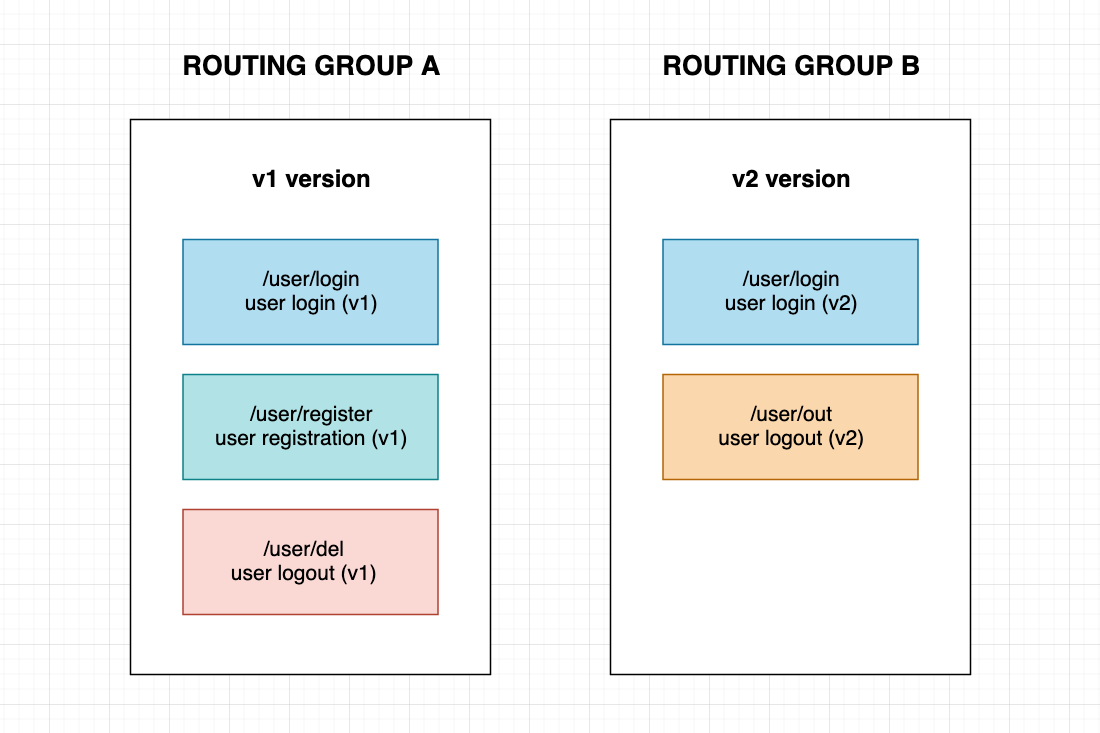What is a Routing Group?
From the literal meaning, a routing group refers to a group of routes. So what kind of routes can be classified into a group? In actual use, the more common scenario is to group according to the version. Such as the following figure:

Use Grammar
A function is provided in the Gin framework to Group manage routes in groups. The usage syntax is as follows:
- No nested groups:
v1 := engine.Group("v1")
{
v1.GET("/path/xxx", func(context *gin.Context) {
...
})
v1.POST("/user/xxx", func(context *gin.Context) {
...
})
}- Nested grouping:
api := engine.Group("api")
{
user := api.Group("user")
{
user.GET("path", func(context *gin.Context) {
...
})
user.POST("path", func(context *gin.Context) {
...
})
}
}Multi-version Combat (without nested routing)
Code example
//-- main.go -------
package main
import (
"github.com/gin-gonic/gin" // Import Gin framework
"go_use/practise" // Code sample package
)
func main () {
// create a default routing engine
engine := gin.Default()
// register routes
practise.TestRouteGroup(engine)
_ = engine.Run(":9090")
}
//--- go_use/practise/routing_use.go -------
// --- routing group using
func TestRouteGroup(engine * gin.Engine) {
// routing group A (v1 version)
v1 : = engine.Group("v1")
{
v1.GET("/user/login", func(context *gin.Context) {
context.JSON(200, gin.H{"msg": "v1-login successful"})
})
v1.GET("/user/register", func(context *gin.Context) {
context.JSON(200, gin.H{"msg": "v1-registered successfully"})
})
v1.GET("/user/del", func(context *gin.Context) {
context.JSON(200, gin.H{"msg": "v1-logout successful"})
})
}
// routing group B (v2 version)
v2 := engine.Group("v2")
{
v2.GET("/user/login", func(context *gin.Context) {
context.JSON(200, gin.H{"msg": "v2-login successful"})
})
v2.GET("/user/out", func(context *gin.Context) {
context.JSON(200, gin.H{"msg": "v2-user logout"})
})
}
}- Service startup
[GIN-debug] [WARNING] Creating an Engine instance with the Logger and Recovery middleware already attached.
[GIN-debug] [WARNING] Running in "debug" mode. Switch to "release" mode in production.
- using env: export GIN_MODE=release
- using code: gin.SetMode(gin.ReleaseMode)
#Registered routes are as follows
[GIN-debug] GET /v1/user/login -- > go_use/practise.TestRouteGroup.func1 (3 handlers)
[GIN-debug] GET /v1/user/register --> go_use/practise.TestRouteGroup.func2 (3 handlers)
[GIN-debug] GET /v1/user/del --> go_use/practise.TestRouteGroup.func3 (3 handlers)
[GIN-debug] GET /v2/user/login --> go_use/practise.TestRouteGroup.func4 (3 handlers)
[GIN-debug] GET /v2/user/out --> go_use/practise.TestRouteGroup.func5 (3 handlers)
[GIN-debug] Environment variable PORT is undefined. Using port :9090 by default
[GIN-debug] Listening and serving HTTP on :9090- Request return
$ curl -X GET http://127.0.0.1:9090/v1/user/login
{"msg": "v1-login successful"}
$ curl -X GET http://127.0.0.1:9090/v1/user/register
{"msg": "v1-registered successfully" }
$ curl -X GET http://127.0.0.1:9090/v1/user/del
{"msg": "v1-logout successful" }
$ curl -X GET http://127.0.0.1:9090/v2/user/login
{"msg": "v2-login successful" }
$ curl -X GET http://127.0.0.1:9090/v2/user/out
{"msg": "v2-user-logout"}
$ curl -X GET http://127.0.0.1:9090/v2/user/del
404 page not foundThrough the above example, we confirmed the
Ginframework can perform routing grouping by version, it does not support API version inheritance, such as accessing: http://127.0.0.1:9090/v2/user/del, expecting to return{“msg”:”v1-logout successful”}
Module separation (nested routing)
- Code Example
//-- main.go -------
package main
import (
"go_use/practise"
"github.com/gin-gonic/gin"
)
func main() {
// Create a default routing engine
engine := gin.Default()
// Register route
practise.TestRouteGroupNested(engine)
_ = engine.Run(":9090")
}
//--- go_use/practise/routing_use.go -------
// Route Nested Groups
func TestRouteGroupNested(engine *gin.Engine) {
// Interface
api := engine.Group("api")
{
user := api.Group("user")
{
user.GET("login", func(context *gin.Context) {
context.JSON(200, gin.H{"msg": "api-login successful"})
})
}
}
// Backstage
admin := engine.Group("admin")
{
user := admin.Group("user")
{
user.GET("login", func(context *gin.Context) {
context.JSON(200, gin.H{"msg": "admin-login successful"})
})
}
}
}- Service startup
[GIN-debug] [WARNING] Creating an Engine instance with the Logger and Recovery middleware already attached.
[GIN-debug] [WARNING] Running in "debug" mode. Switch to "release" mode in production.
- using env: export GIN_MODE=release
- using code: gin.SetMode(gin.ReleaseMode)
#Registered routes are as follows
[GIN-debug] GET /api/user/login -- > go_use/practise.TestRouteGroupNested.func1 (3 handlers)
[GIN-debug] GET /admin/user/login --> go_use/practise.TestRouteGroupNested.func2 (3 handlers)
[GIN-debug] Environment variable PORT is undefined. Using port :9090 by default
[GIN-debug] Listening and serving HTTP on :9090- Request return
$ curl - X GET http: //127.0.0.1:9090/api/user/login
{"msg": "api-login successful"}
$ curl - X GET http: //127.0.0.1:9090/admin/user/login
{"msg": "admin-login successful"}

